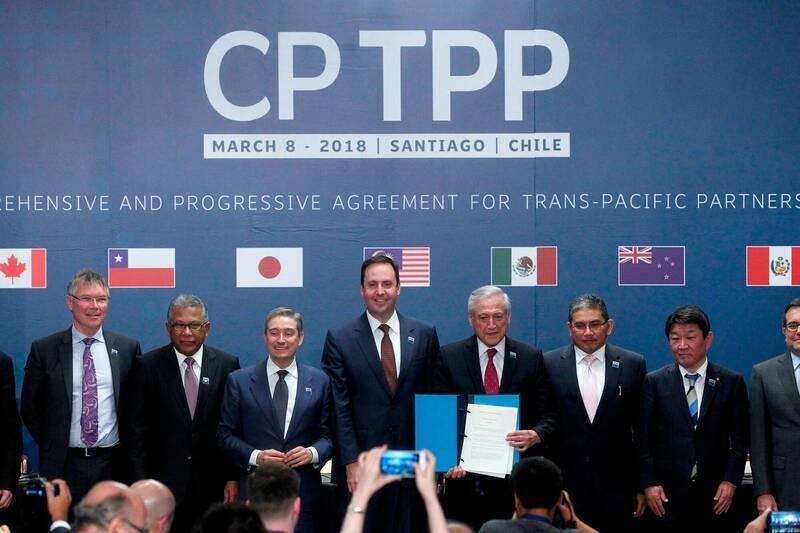Delegates of the Comprehensive and Progressive Agreement for Trans-Pacific Partnership (CPTPP) intend to sidestep politically sensitive decisions on China and Taiwan’s future membership when they meet in Canada this week, the news outlet Politico reported yesterday.
Delegates of the regional trade bloc hope that by putting off the decisions on China and Taiwan’s applications to a later date, they will avoid the thorny politics of Beijing’s One China policy, Politico reported.
“The issue with Taiwan is that it has not garnered consensus among certain members — notably Malaysia and Singapore,” Vina Nadjibulla, a vice-president of the Asia Pacific Foundation of Canada think tank, told Politico.

Photo: AFP
Any talk about “progressing negotiations for any aspirant economy will have to be reached by consensus,” said a senior Canadian government official quoted in the story.
CPTPP represents about 15 percent of the global economy. Current members include Japan, Australia, New Zealand, Canada, Peru, Chile, Mexico, Brunei, Singapore, Vietnam and Malaysia.
Vietnam, Singapore and Malaysia — which are allied with Beijing and count China among their largest trade partners — have said publicly that they support China’s accession, the news report said.
Taiwan is well-prepared to join the CPTPP, Executive Yuan spokeswoman Michelle Lee (李慧芝) said at a press conference in Taipei today.
Taiwan adheres to the Auckland Principles to meet the trade bloc’s high standards, Lee added, saying that the government pushed for joining CPTPP with multilateral and unilateral means.
Auckland Principles include adhering to the high standards and rules of the deal, a demonstrated track record of obeying the rules of existing agreements and garnering consensus support from all of the bloc’s existing members.
Taiwan can meet two of the three requirements for new members “but not the consensus one,” a senior official from another CPTPP member nation involved in the discussions told Politico, noting there are “a few members to persuade.”
Democratic Progressive Party caucus secretary-general Rosalia Wu (吳思瑤) today said it is sad that Taiwan was prevented from joining the CPTPP because of political reasons despite acting in accordance with international regulations and treaties and making preparations in advance.
Former president Tsai Ing-wen (蔡英文) urged Taiwanese compatriots in Canada to continue to work for Taiwan by supporting its bid to join the CPTPP during her visit to the country last week.
Additional reporting by Li Wen-hsin and Chung Li-hua

Nvidia Corp yesterday unveiled its new high-speed interconnect technology, NVLink Fusion, with Taiwanese application-specific IC (ASIC) designers Alchip Technologies Ltd (世芯) and MediaTek Inc (聯發科) among the first to adopt the technology to help build semi-custom artificial intelligence (AI) infrastructure for hyperscalers. Nvidia has opened its technology to outside users, as hyperscalers and cloud service providers are building their own cost-effective AI chips, or accelerators, used in AI servers by leveraging ASIC firms’ designing capabilities to reduce their dependence on Nvidia. Previously, NVLink technology was only available for Nvidia’s own AI platform. “NVLink Fusion opens Nvidia’s AI platform and rich ecosystem for

WARNING: From Jan. 1 last year to the end of last month, 89 Taiwanese have gone missing or been detained in China, the MAC said, urging people to carefully consider travel to China Lax enforcement had made virtually moot regulations banning civil servants from making unauthorized visits to China, the Control Yuan said yesterday. Several agencies allowed personnel to travel to China after they submitted explanations for the trip written using artificial intelligence or provided no reason at all, the Control Yuan said in a statement, following an investigation headed by Control Yuan member Lin Wen-cheng (林文程). The probe identified 318 civil servants who traveled to China without permission in the past 10 years, but the true number could be close to 1,000, the Control Yuan said. The public employees investigated were not engaged in national

ALL TOGETHER: Only by including Taiwan can the WHA fully exemplify its commitment to ‘One World for Health,’ the representative offices of eight nations in Taiwan said The representative offices in Taiwan of eight nations yesterday issued a joint statement reiterating their support for Taiwan’s meaningful engagement with the WHO and for Taipei’s participation as an observer at the World Health Assembly (WHA). The joint statement came as Taiwan has not received an invitation to this year’s WHA, which started yesterday and runs until Tuesday next week. This year’s meeting of the decisionmaking body of the WHO in Geneva, Switzerland, would be the ninth consecutive year Taiwan has been excluded. The eight offices, which reaffirmed their support for Taiwan, are the British Office Taipei, the Australian Office Taipei, the

DANGEROUS DRIVERS: The proposal follows a fatal incident on Monday involving a 78-year-old driver, which killed three people and injured 12 The Ministry of Transportation and Communications yesterday said it would lower the age for elderly drivers to renew their license from 75 to 70 as part of efforts to address safety issues caused by senior motorists. The new policy was proposed in light of a deadly incident on Monday in New Taipei City’s Sansia District (三峽), in which a 78-year-old motorist surnamed Yu (余) sped through a school zone, killing three people and injuring 12. Last night, another driver sped down a street in Tainan’s Yuching District (玉井), killing one pedestrian and injuring two. The incidents have sparked public discussion over whether seniors